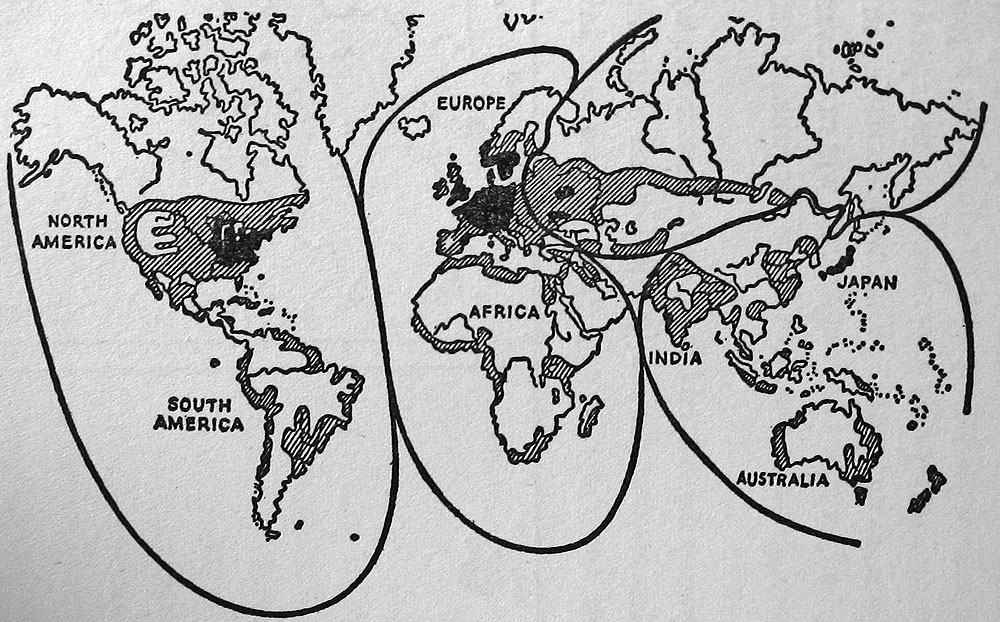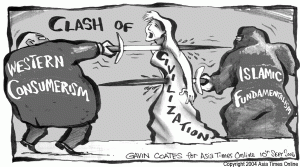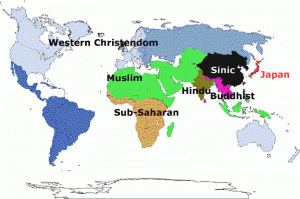
With the war in Ukraine spewing havoc, demand for geopolitics is high. However, the most clear-eyed writer on geopolitics was not Sir Halford Mackinder (1861-1947). Nor was he Prof. Samuel Huntington (1927-2008). The former in his 1904 essay, “The Geographical Pivot of History” made the mistake of assuming that Eastern Europe—“The Heartland,” as he called it—would always remain the crucible of the world, thus entirely missing the gigantic, and still continuing, struggle waged by the US, Russia, Japan, and China over the Pacific. The latter in his 1996 book, The Clash of Civilizations, focuses on cultural differences among the world’s most important seven civilizations but has surprisingly little to say about what the wars he fully expects would look like.
Yet there is a book that avoids both of these errors; one, moreover, that was authored not by a social scientist, as both Mackinder and Huntington were, but by a journalist and writer of fiction. His name was George Orwell and his book, Nineteen Eighty-Four, was published in 1949, shortly before his death.
Follow some excerpts.
“The splitting up of the world into three great super-states was an event which could be and indeed was foreseen before the middle of the twentieth century. With the absorption of Europe by Russia and of the British Empire by the United States, two of the three existing powers, Oceania and Eurasia, were already effectively in being. The third, Eastasia, only emerged as a distinct being after another decade of confused fighting. The frontiers between the three super-states are in places completely arbitrary, and in others they fluctuate according to the fortunes of war, but in general they follow geographical lines… In one combination of another these three super-states are permanently at war, and have been for the past twenty-five years.
War, however, is no longer the desperate, annihilating struggle that it was during the early decades of the twentieth century. It is warfare of limited aims between combatants who are unable to destroy one another, have no material cause for fighting and are not divided by any genuine ideological difference. This is not to say that either the conduct of war, or the prevailing attitude towards it, has become less bloodthirsty or more chivalrous. On the contrary… such acts as raping, looting, the slaughter of children, the reduction of whole populations to slavery, and reprisals against prisoners which extend even to boiling and burying alive, are looked upon as normal, and, when they are committed by one’s own side and not by the enemy, meritorious. But in a physical sense war involves very small numbers of people, mostly highly-trained specialists, and causes comparatively few casualties. The fighting, when there is any, takes place on the vague frontiers whose whereabouts the average man can only guess at, or round the Floating Fortresses which guard strategic spots on the sea lanes…
To understand the nature of the present war… one must realize in the first place that it is impossible for it to be decisive. None of the three super-states could be definitively conquered even by the other two in combination. They are too evenly matched, and their natural defenses are too formidable. Eurasia is protected by its vast land spaces, Oceania by the width of the Atlantic and the Pacific, Eastasia by the fecundity and industriousness of its inhabitants…
[Inside each super-state, the two aims of the ruling elite] are to conquer the whole surface of the earth and to extinguish once and for all the possibility of independent thought. There are therefore two great problems which the [elite] is concerned to solve. One is how to discover, against his will, what another human being is thinking, and the other is how to kill several hundred million people in a few seconds without giving warning beforehand. In so far as scientific research still continues, this is its subject matter. The scientist of today is either a mixture of psychologist and inquisitor, studying with real ordinary minuteness the meaning of facial expressions, gestures, and tones of voice, and testing the truth-producing effects of drugs, shock therapy, hypnosis, and physical torture; or he is chemist, physicist, or biologist concerned only with such branches of his special subject… the teams of experts are indefatigably at work. Some are concerned simply with planning the logistics of future wars; others devise larger and larger rocket bombs, more and more powerful explosives, and more and more impenetrable armor-plating; others search for new and deadlier gases, or for soluble poisons capable of being produced in such quantities as to destroy the vegetation of whole continents, or for breeds of disease germs immunized against all possible antibodies; others strive to produce a vehicle that shall bore its way under the soil like a submarine under the water, or an aeroplane as independent of its base as a sailing-ship; others explore even remoter possibilities such as focusing the sun’s rays through lenses suspended thousands of kilometers away in space, or producing artificial earthquakes and tidal waves by tapping the heat at the earth’s center. But none of these projects ever comes anywhere near realization, and none of the three super-states ever gains a significant lead on the others.
What is more remarkable is that all three powers already possess, in the atomic bomb, a weapon far more powerful than any that their present researches are likely to discover… atomic bombs first appeared as early as the nineteen-forties… The effect was to convince the ruling groups of all countries that a few more atomic bombs would mean the end of organized society, and hence of their own power. Thereafter, although no formal agreement was ever made or hinted at, no more bombs were dropped. All three powers merely continue to produce atomic bombs and store them up against the decisive opportunity which they all believe will come sooner or later. And meanwhile the art of war has remained almost stationary… Helicopters are more used than they were formerly, bombing planes have been largely superseded by self-propelled projectiles, and the fragile movable battleship has given way to the almost unsinkable Floating Fortress; but otherwise there has been little development. The tank, the submarine, the torpedo, the machine gun, even the rifle and the hand grenade are still in use. And in spite of the endless slaughters reported in the Press and on the telescreens, the desperate battles of earlier wars, in which hundreds of thousands or even millions of men were often killed in a few weeks, have never been repeated. None of the three super-states ever attempts any manoeuver which involves the risk of serious defeat. When any large operation is undertaken, it is usually a surprise attack against an ally. The strategy that all three powers are following, or pretend to themselves that they are following, is the same. The plan is, by a combination of fighting, bargaining, and well-timed strokes of treachery, to acquire a ring of bases completely encircling one or other of the rival states, and then to sign a pact of friendship with that rival and remain on peaceful terms for so many years as to lull suspicion to sleep. During this time rockets loaded with atomic bombs can be assembled at all the strategic spots; finally they will all be fired simultaneously, with effects so devastating as to make retaliation impossible. It will then be time to sign a pact of friendship with the remaining world-power, in preparation for another attack…”
Need I say more?


